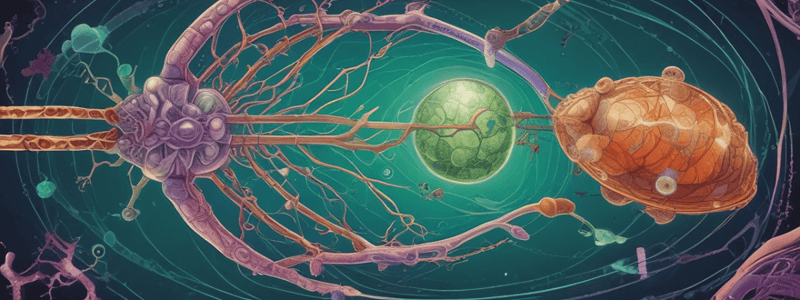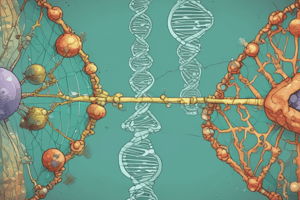Podcast
Questions and Answers
What does evolutionary biology study?
What does evolutionary biology study?
- Species diversification and extinction (correct)
- Interactions between organisms and their environment
- Development of organisms from a single cell
- Immune responses and immune cell types
Which area of biology focuses on how organisms develop from a single cell into complex beings?
Which area of biology focuses on how organisms develop from a single cell into complex beings?
- Neurobiology
- Developmental Biology (correct)
- Immunology
- Plant Pathology
What is the main focus of immunology as a field of study?
What is the main focus of immunology as a field of study?
- Study of plant diseases and pathogens
- Study of the immune system and responses to disease (correct)
- Study of interactions between organisms and their environment
- Study of molecular basis of biological processes
What does ecology encompass in its study?
What does ecology encompass in its study?
What does environmental biology primarily focus on?
What does environmental biology primarily focus on?
Which area of biology focuses on the structure and function of DNA, RNA, and proteins?
Which area of biology focuses on the structure and function of DNA, RNA, and proteins?
What is the main focus of cell biology?
What is the main focus of cell biology?
Which field deals with the study of DNA and RNA?
Which field deals with the study of DNA and RNA?
What does evolutionary biology primarily study?
What does evolutionary biology primarily study?
Which aspect of biology pertains to gene regulation and genetic engineering?
Which aspect of biology pertains to gene regulation and genetic engineering?
What is the fundamental unit of life according to biology?
What is the fundamental unit of life according to biology?
Which topic includes the study of cellular signaling and DNA replication?
Which topic includes the study of cellular signaling and DNA replication?
Flashcards are hidden until you start studying
Study Notes
The Fascinating World of Biology: From Cells to Ecosystems
Biology, the scientific study of life, encompasses a wide range of topics and disciplines, all aimed at understanding the complex and diverse processes that govern life on Earth. From the microscopic world of cells and molecules to the vast ecosystems that sustain life, biology offers a wealth of knowledge and discoveries. In this article, we'll explore some of the key topics and subtopics within the field of biology.
Cell Biology
At the heart of all living organisms are cells, the basic unit of life. Cell biology is the study of cells and their functions, including cell structure, cell division (mitosis and meiosis), cellular signaling, and the processes that occur within cells (such as protein synthesis and DNA replication). It is a fundamental aspect of biology that bridges the microscopic world of molecules and the macroscopic world of organisms.
Genetics
Genetics is the study of heredity and the variation of inherited characteristics in organisms. It deals with the transmission and expression of genetic information from parents to offspring and the factors that shape the diversity of life. Genetic research topics include the study of DNA and RNA, gene regulation, genetic engineering, and the application of genetics to human health and disease.
Evolutionary Biology
Evolutionary biology is the study of how living organisms change over time through natural selection and other processes. It includes the study of species diversification, the distribution and extinction of species, and the relationships between different organisms. Evolutionary biology provides insights into the history of life on Earth and the processes that shape the diversity of life today.
Developmental Biology
Developmental biology is the study of how organisms develop from a single cell into complex, multicellular beings. It includes the study of embryonic development, tissue growth and differentiation, and the regulation of gene expression during development.
Immunology
Immunology is the study of the immune system, the complex network of cells and molecules that protect organisms from disease and infection. It includes the study of immune cell types, immune responses, and the regulation of these processes.
Ecology
Ecology is the study of interactions between organisms and their environment, including the distribution and abundance of species, the relationships between species, and the ecological processes that shape ecosystems. Ecology encompasses a wide range of subdisciplines, such as population biology, community ecology, and ecosystem ecology.
Environmental Biology
Environmental biology is the study of how organisms interact with their environment, including the effects of human activities on ecosystems. It includes the study of pollution, climate change, and conservation biology.
Plant Pathology
Plant pathology is the study of plant diseases and the organisms that cause them. It includes the study of disease symptoms, disease cycles, and the mechanisms by which pathogens infect plants. Plant pathology is a crucial aspect of agriculture, as it helps to develop strategies for controlling plant diseases and improving plant health.
Neurobiology
Neurobiology is the study of the nervous system and its functions, including the study of neurons, synapses, and the processes that underlie perception, learning, and memory.
Molecular Biology
Molecular biology is the study of the molecular basis of biological processes, including the structure and function of DNA, RNA, and proteins. It includes the study of genetic information processing, gene regulation, and molecular interactions.
These topics and subtopics are just a few of the many areas within the field of biology. Each of these areas offers a wealth of knowledge and research opportunities, providing a rich foundation for understanding the complex and fascinating world of life on Earth.
Studying That Suits You
Use AI to generate personalized quizzes and flashcards to suit your learning preferences.




